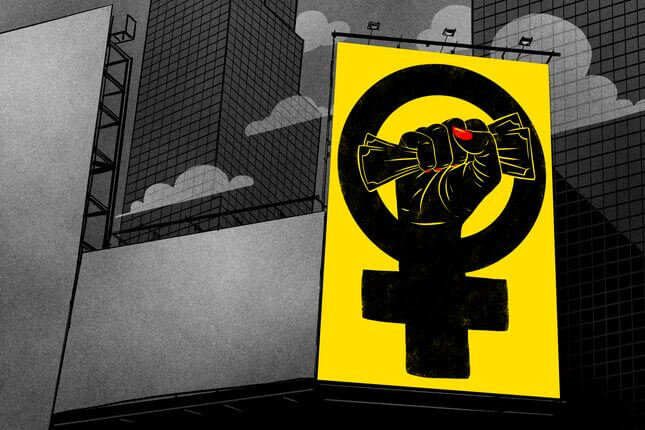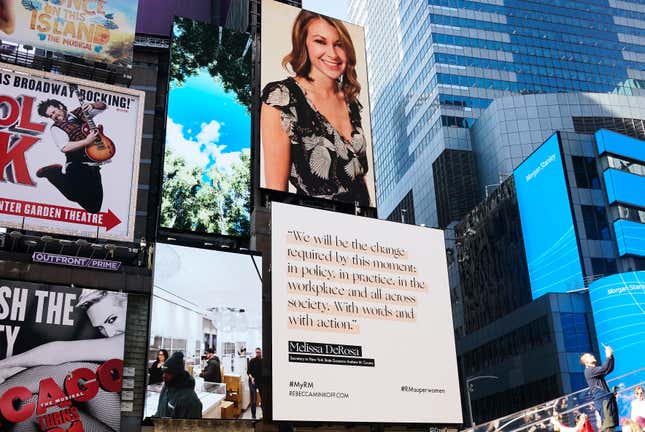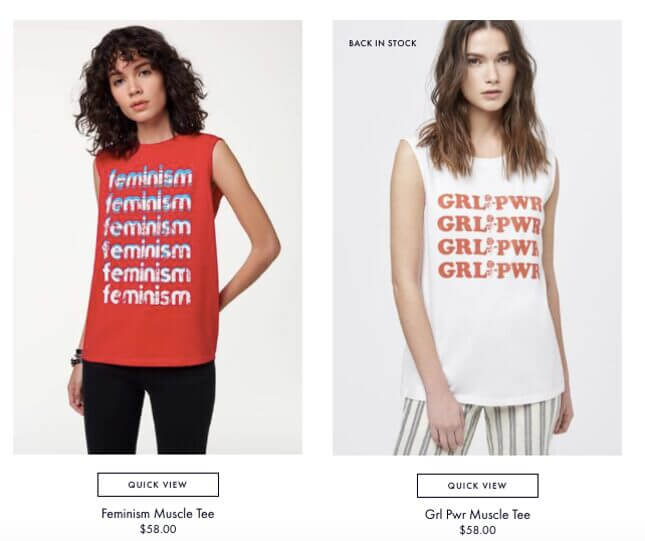When a Public Official Sells Feminism, Who Is Being Empowered?
Politics

The women’s movement has experienced a thrilling resurgence in the time since Donald Trump was elected president, and along with it, the less thrilling phenomenon of commercial feminism. This is a messy state of affairs as it is, but when public officials are involved in packaging empowerment as a product to be consumed, the intended message can get even more garbled.
This uncomfortable convergence was on display in late February when a billboard went up in Times Square featuring fashion designer Rebecca Minkoff’s “RM Superwoman” campaign, an initiative meant to encourage women to “stay fearless,” according to Minkoff. One of the superwomen featured on the billboard is Melissa DeRosa, the highest-ranking official in New York Gov. Andrew Cuomo’s administration, who was pictured wearing a $228 dress for sale in the “Girl PWR Shop” section of rebeccaminkoff.com.
The campaign launched with a series of portraits of leaders from “today’s new and emerging era of feminist activism,” according to the brand’s website. In addition to DeRosa, this list mostly includes women activists affiliated with the Women’s March, as well as the actress Zosia Mamet, Milk makeup founder Zanna Rassi, musician Connie Lim, creative consultant Brianna Lance, and former Fox News host Gretchen Carlson.
The empowerment-themed campaign is for-profit—a spokesperson for Minkoff confirmed to Jezebel that the proceeds from products featured in the campaign don’t go to charity, but said that Minkoff kicked off the campaign with a monetary donation to the Women’s March (they wouldn’t confirm the amount). “We received a donation from Rebecca Minkoff, and we enjoyed collaborating with her,” a spokeswoman from the Women’s March told Jezebel.
“We will be the change required by this moment: in policy, in practice, in the workplace and all across society. With words and with action,” DeRosa is quoted as saying underneath her billboard photo, next to her name and job title. Rebeccaminkoff.com is linked on the billboard. (The billboard campaign ended in March.)


In the #MeToo era, it’s understandable that a Democratic administration, especially one seeking a third term, would want to be seen as supportive of feminism. It’s also not controversial that a woman-owned company would want to put together a campaign that celebrates noteworthy women, particularly when consumers increasingly expect brands to take a stance on social issues. Experts, however, told Jezebel that DeRosa’s decision to appear in Rebecca Minkoff’s RM Superwoman campaign raises some ethical questions. In Albany, where several allies to the governor have been indicted on corruption charges, it can be difficult to find answers.
“Having state officials featured in ads turns policy meetings into ethical minefields,” Jeff Trexler, attorney and associate director of the Fashion Law Institute at Fordham University, told Jezebel.
“I’ve never heard of anything like this before,” said Blair Horner, executive director of the New York Public Interest Research Group. As a rule of thumb, he said, public officials “are not supposed to be advertising products for businesses,” but he emphasized that DeRosa’s participation in the campaign appeared to exist in an ethical gray area, and that it would be best practice—though not required—for her to clear it with the Joint Commission on Public Ethics (JCOPE), the agency tasked with conflict-of-interest oversight as part of Cuomo’s 2011 “Clean Up Albany Act.”
To extoll the importance of women in our society is a good thing, but to do it right matters.
DeRosa, 35, is the first woman to be appointed as secretary to the governor. She is the chair of the New York State Council on Women and Girls, an initiative that Cuomo announced in response to the Trump administration’s dismantling of Obama’s White House Council on Women and Girls. (Minkoff serves on the council’s board, which is how the two met, according to Minkoff’s spokesperson.)
On multiple background calls, representatives from the governor’s office denied that there was any ethical violation, or that there was sufficient reason to take the issue to JCOPE. They disputed the notion that the campaign qualifies as an advertisement (though it advertises products, so it doesn’t, according to the state’s own rules, appear to qualify as a public service announcement).
“Melissa was one of 19 women asked to participate in a female empowerment campaign coinciding with the launch of the 2018 Women’s March,” Abbey Fashouer, first deputy press secretary to Cuomo, told Jezebel in a statement. “She was proud to do it and sought and received full clearance from the Executive Chamber’s ethics officer, who found that the campaign sponsor does not have any contracts with the state, does not lobby the state, is not regulated by the Chamber, nor will appear before the Chamber and thus her uncompensated participation was allowed. This was a positive, uplifting effort focusing on many of the same issues Jezebel has covered in the past and I hope will continue to cover.”
A Cuomo administration official confirmed that DeRosa did not consult with JCOPE, which declined to provide Jezebel with comment (and which has its own critics, but that’s another long story), prior to her participation. They added, as asserted above, that she consulted the internal ethics officer assigned to Cuomo’s office, who determined that there was no conflict. But what’s the point of an ethics commission if they aren’t getting consulted on something this unusual and high-profile?
“I think it’s a big mistake not to go to JCOPE,” Horner said, citing the unique nature of the situation and arguing that seeking advice from internal counsel was potentially inadequate given DeRosa’s high-ranking position in the executive branch, especially in the middle of the corruption trial of former Cuomo aide Joseph Percoco. “To extoll the importance of women in our society is a good thing, but to do it right matters,” he said.
(The Cuomo administration declined to provide Jezebel with a copy of the internal ethics officer’s decision. A FOIL request is pending.)
A Rebecca Minkoff spokesperson told Jezebel that while proceeds from the products would not be going to charity, the people who worked on the campaign were donating their time, and the billboard space itself was donated by Clear Channel Outdoor Inc. (Regarding that donation, a Minkoff spokesperson said, “We have no knowledge of Clear Channel’s business and have no legal or contractual relationship with them.”) DeRosa did not keep the dress, the administration official and a rep for Minkoff told Jezebel.
“The RMSuperwomen campaign launch featured leaders of the Women’s March Committee and trailblazers of the modern women’s movement and Melissa was one of the 19 fearless women being honored,” Rebecca Minkoff spokesperson Jordana Jaffe said in an emailed statement. “The Executive Chambers Ethics Officer contacted us prior to her participation and determined there was no conflict of interest—period.”
In the muddy road from activism to socially-conscious ad campaign to socially-conscious ad campaign honoring a public official, it’s pretty unclear who is being empowered.
The billboard donation doesn’t necessarily mitigate ethics concerns, Trexler argued. “I would say this is problematic, particularly in regard to Clear Channel, because Clear Channel is a company that has repeat business with the state of New York, and has spent a lot of money [on lobbying] to influence the state of New York.” (According to the New York Open Government website, Clear Channel Outdoor has paid three lobbying firms over $1.5 million to lobby on 997 bills from 2007 to 2016.) Clear Channel did not respond to multiple requests for comment.
“If someone files a complaint and it’s found that [DeRosa] did the wrong thing, it’s hugely embarrassing and potentially costly,” Horner told Jezebel, regarding the billboard campaign. “[It] tarnishes what was supposed to be a celebration of women’s empowerment. Instead, it ends up being a conversation about something else.”
This latest hint of Albany’s somewhat freewheeling approach to ethics also highlights flaws in the Cuomo administration’s appeals to women.
Although Cuomo maintains a generally high approval rating among women and minorities and has pushed increasingly aggressive progressive actions since his 2014 reelection—most recently including an affordable childcare tax credit, paid family leave, a $15 minimum wage plan, and executive orders aimed at reducing the wage gap, as well as tightened gun restrictions on people convicted of domestic violence—he has been slow to embrace some policies, like the minimum wage plan, that would materially improve women’s lives across the state.
The governor also found himself in hot water in October over campaign contributions from Harvey Weinstein. About a week after Cuomo finally agreed to return the rest of the money Weinstein gave him, DeRosa gave a speech at Wellesley College in which she shared her own experiences with sexual harassment, recalled being “defined” by the media through her father, a top Albany lobbyist, and spoke out on the need for a “societal course correction” post-Weinstein.
However, Cuomo’s legislative team developing New York’s new sexual harassment policy was initially entirely male and includes Senator Jeffrey Klein, who was accused of forcibly kissing a former staffer (he has denied this). The Reproductive Health Act continues to be stalled by the Independent Democratic Caucus in Albany, whose alliance with the GOP has allowed Republicans to rule the state Senate from the minority. In place of the RHA, Cuomo, who many blamed for the IDC’s hold on the Senate, has proposed a Constitutional amendment that would likely be much more difficult to pass.
(Earlier this month, amid intense public criticism from primary opponent Cynthia Nixon, Cuomo pushed a deal to dissolve the IDC, despite previously insisting that he had no power over such things.)
Meanwhile, Cuomo’s Women’s Equality Party, or WEP, appears to be back in the game, though Crains reports its only funding right now appears to come from a descendent of Standard Oil founder John D. Rockefeller. The WEP, a redundant and questionable political party that Cuomo created in July 2014, competed with the Working Families Party—a party with a similar acronym that has long fought for women’s interests—on the ballot and was later coopted by GOP candidates.
The convoluted tale of this Times Square billboard points to a broader tendency of the Cuomo administration to approach “women’s issues” in an occasionally tortured manner that could be construed as self-serving—and in a marketing landscape where feminist gestures can get conflated with meaningful activism, there are no shortage of opportunities to do so. It remains unclear whether anyone involved with the empowerment campaign in question violated any ethics laws, or even flouted any required procedures; JCOPE would ultimately need to make that determination, Horner said. “Ethics as a field is dynamic,” Trexler, of the Fashion Law Institute at Fordham, explained in an email. “It goes beyond strict application of law to how people perceive transactions and relationships.”
But in the muddy road from activism to socially-conscious ad campaign to socially-conscious ad campaign honoring a public official, it’s also pretty unclear who is being empowered.